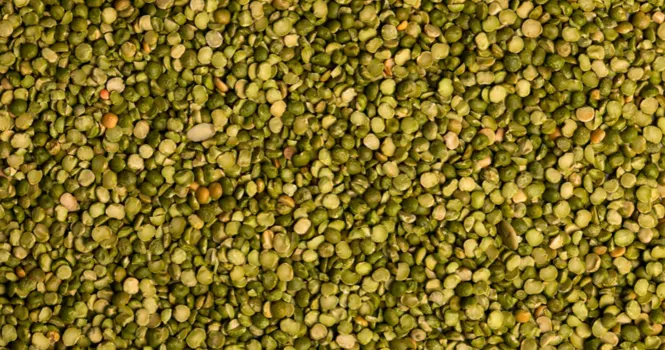Ash Gourd
What is Ash Gourd?
Ash gourd, also known as winter melon, white gourd, wax gourd, or white pumpkin, is a vine-grown fruit that is used as a vegetable in cooking. Its scientific name is Benincasa hispida. It is native to Southeast Asia but is now grown in many parts of the world.
In Sanskrit, the term for “ash gourd” is “Kushmanda” (कुष्माण्ड). “Kushmanda” is derived from two words: “Kushma” meaning “pumpkin” or “gourd,” and “anda” meaning “egg.” Therefore, “Kushmanda” literally translates to “egg-shaped gourd.”

This fruit is large and round or oblong in shape, and its skin is usually covered with a distinctive ash or wax coating. The inside of the fruit is fleshy and filled with seeds, similar to a pumpkin or melon. When ripe, the fruit has a sweet, mild flavor and can be eaten raw or cooked.
It is used in a variety of dishes, including soups, stews, stir-fries, and desserts. It’s also used in traditional medicine, particularly in Ayurveda, for its purported health benefits.
As for nutrition, it is low in calories but high in fiber. It also contains a good amount of vitamin C and other nutrients.

Other Names for Ash Gourd
In different regions of India, ash gourd is known by various names. Here are some of the common regional names,
- Petha (Hindi)
- Boodida Gummadikaya (Telugu)
- Poosanikai (Tamil)
- Kumbalanga (Malayalam)
- Kola Kassu (Kannada)
- Kumhada (Gujarati)
- Kohla (Marathi)
- Boodi Kumbalakai (Kannada)
- Ash Gourd (English, used as a generic term across India)
Some other alternative names across the world are,
- Petha: This is a common name for ash gourd in Hindi and is widely used in India.
- Safed Kaddu: In Hindi, “safed kaddu” translates to “white pumpkin,” which is another name for ash gourd.
- White Pumpkin: It is sometimes referred to as white pumpkin due to its appearance.
- Winter Melon: This is a widely used name for ash gourd, particularly in English-speaking countries.
- Dong Gua: In Chinese cuisine, ash gourd is known as “dong gua” or “winter melon.”
- Fak Khiao: This is the Thai name for ash gourd, commonly used in Thai cuisine.
- Pooshnikai: In Tamil, ash gourd is known as “pooshnikai” or “poosanikai.”
- Boodida Gummadikaya: This is the name for ash gourd in Telugu, spoken in the southern part of India.
Nutritional Info
Ash gourd, also known as winter melon, is a nutritious vegetable that’s packed with various vitamins and minerals. Here’s a rough breakdown of the nutritional content per 100 grams of raw ash gourd:
- Calories: 13-20 kcal
- Protein: 0.4 g
- Fat: 0.1 g
- Carbohydrates: 3-4 g
- Dietary fiber: 2.9 g
- Sugars: 2.6 g
It also contains several vitamins and minerals:
- Vitamin C: 13 mg (around 22% of the Daily Recommended Intake or DRI)
- Vitamin B1 (Thiamin): 0.04 mg
- Vitamin B2 (Riboflavin): 0.03 mg
- Vitamin B3 (Niacin): 0.4 mg
- Vitamin B6: 0.04 mg
- Folate: 7 µg
And minerals:
- Calcium: 19 mg
- Iron: 0.4 mg
- Magnesium: 10 mg
- Phosphorus: 19 mg
- Potassium: 6 mg
- Zinc: 0.61 mg
This nutrient composition makes it a low-calorie food with a high water content, which can be beneficial for hydration and weight management. The high fiber content contributes to digestive health, while vitamins and minerals support overall health.
Please note that the nutritional composition can vary slightly depending on the specific variety of ash gourd and its maturity.
Ash Gourd Benefits For Diabetes
It is often used in traditional medicine, including Ayurveda, and may offer several potential benefits for people with diabetes, although more research is needed to confirm these effects.
Here are a few ways it might benefit individuals with diabetes:
- Low in Carbohydrates: It is a low-carb vegetable, making it a good choice for people with diabetes who are managing their carb intake.
- High in Fiber: The high fiber content in ash gourd could slow the absorption of sugar into the bloodstream, thereby preventing spikes in blood glucose levels. This could help maintain better glycemic control.
- May Improve Insulin Sensitivity: Some preliminary research suggests that ash gourd could potentially improve insulin sensitivity, though more scientific studies are needed to confirm this.
- Antioxidant Properties: It contains antioxidants, which can help combat oxidative stress. Oxidative stress is thought to play a role in the development and progression of diabetes and its complications.
- Low in Calories: As a low-calorie food, ash gourd can contribute to a balanced and healthy diet, which is important for weight management. Maintaining a healthy weight can be beneficial for people with type 2 diabetes.
Remember, while it can be part of a healthy diet, it should not replace any medications or treatments prescribed by a doctor for managing diabetes. Always talk with your healthcare provider before making significant changes to your diet or treatment plan.
Benefits For Weight Loss
It can indeed be beneficial for weight loss for several reasons:
- Low in Calories: It is low in calories, meaning you can consume a larger volume of it without consuming too many calories. This can help you feel full and satisfied without overeating.
- High in Fiber: It is high in dietary fiber. Foods that are high in fiber tend to be more filling, so you’re likely to eat less and stay satisfied longer, which can help with weight control. Fiber also aids in digestion and helps prevent constipation.
- High Water Content: The high water content in ash gourd can help you stay hydrated. It also adds volume to the food, which helps you feel full.
- Boosts Metabolism: Some research suggests that it may have properties that help boost metabolism, though more research is needed to confirm this.
- Detoxifying Properties: In traditional medicine like Ayurveda, it is believed to have detoxifying properties, which might contribute to weight loss.
However, while consuming ash gourd can support weight loss, it’s not a magic solution. Weight loss requires a balanced approach, including a nutritious diet, regular exercise, and a healthy lifestyle.
Also, it’s important to consult with a healthcare professional before making any significant changes to your diet, particularly if you have any health conditions.
How To Make Ash Gourd Juice?
Ash gourd juice, also known as winter melon juice, is a refreshing and healthy beverage. Here is a simple recipe you can follow to make it at home:
Ingredients:
- 1 medium-sized ash gourd
- 1-2 teaspoons of honey (optional)
- Lemon juice to taste (optional)
- A pinch of salt (optional)
- Water if necessary
Steps:
- Peel off the outer skin of the ash gourd.
- Cut it into small pieces and remove the seeds.
- Put the pieces of ash gourd into a blender. Blend until smooth.
- You can add some water if it’s too thick to blend properly.
- Strain the blended ash gourd to remove any remaining pulp.
- Optionally, you can add some honey for sweetness, a pinch of salt, and/or lemon juice for a bit of tanginess.
- Serve chilled.
Please note:
Some people consume ash gourd juice on an empty stomach in the morning due to its purported health benefits. However, each person’s body may react differently, so it’s best to consult with a healthcare professional before starting any new health regimen.
Also, be sure to rinse the ash gourd thoroughly before using it, especially if it’s not organically grown, to remove any pesticide residues.
Benefits of Ash Gourd Juice on Empty Stomach
Drinking ash gourd juice on an empty stomach is a common practice in some cultures and systems of traditional medicine like Ayurveda, due to the belief that it offers several health benefits. Here are some of the benefits commonly associated with this practice:
- Detoxification: Consuming ash gourd juice on an empty stomach may help in flushing out toxins from the body, promoting overall health and vitality.
- Digestive Health: It is rich in fiber, which can aid in digestion, reduce constipation, and maintain healthy bowel movements. Drinking its juice on an empty stomach might boost these benefits.
- Weight Management: As a low-calorie, high-fiber beverage, ash gourd juice can help you feel full and satisfied, which could aid in weight management.
- Hydration: It has a high water content, which makes it a hydrating beverage that’s especially refreshing when consumed in the morning.
- Boosts Energy: Some people believe that drinking ash gourd juice first thing in the morning helps to boost energy levels and improve mental clarity.
- Blood Sugar and Cholesterol: Ash gourd juice is said to help maintain healthy blood sugar levels and reduce bad cholesterol, although more research is needed to confirm these effects.
Remember, while ash gourd juice can be a healthy addition to your diet, it’s important to also maintain a balanced diet and healthy lifestyle overall. Always consult with a healthcare professional before making any major changes to your dietary habits, especially if you have any existing health conditions.
Side Effects of Drinking Ash Gourd Juice
While ash gourd juice is generally considered safe and healthy for most people when consumed in moderate amounts, there can be potential side effects in certain situations:
- Digestive Issues: Overconsumption of ash gourd juice might lead to stomach issues such as indigestion, bloating, or diarrhea in some people.
- Low Blood Sugar Levels: For people with diabetes who are taking medication to lower their blood sugar, consuming ash gourd juice could potentially further lower blood sugar levels, resulting in hypoglycemia. It’s important to monitor blood sugar levels and consult with a healthcare professional.
- Allergic Reactions: Some people may have an allergic reaction to ash gourd. Symptoms could include itching, swelling, dizziness, or trouble breathing. If you experience any of these symptoms after consuming ash gourd juice, seek medical attention.
- Interactions with Medications: Ash gourd juice may interact with certain medications, especially those for diabetes and hypertension. Always consult with a healthcare professional before adding ash gourd juice to your diet if you’re taking any medication.
- Not Suitable for Pregnant or Breastfeeding Women: There’s not enough reliable information about the safety of consuming ash gourd juice during pregnancy or while breastfeeding. Therefore, it’s best to avoid it or consult with a healthcare professional first.
Remember, individual responses to foods can vary. What works well for one person may not work as well for another. It’s always best to listen to your body and consult with a healthcare professional if you have any concerns.
Frequently Asked Questions
Can I Drink Ash Gourd Juice Daily?
Yes, you can drink ash gourd juice daily. It is generally considered safe and healthy when consumed in moderate amounts.
Does Ash Gourd Have Side Effects?
Ash gourd juice can have some side effects, such as digestive issues or potential interactions with certain medications. Some people may also have an allergic reaction to ash gourd.
Is Ash Gourd Good for Kidneys?
It is a natural diuretic which can aid in flushing out toxins and excess water from the body, potentially promoting kidney health.
However, if you have a kidney condition, it’s always best to consult with a healthcare professional before adding new foods or drinks to your diet.
How Long Can We Drink Ash Gourd Juice Daily?
There is no set limit on how long you can drink ash gourd juice daily, as long as you are not experiencing any adverse effects. However, as with any food or drink, moderation is key.
Who Cannot Drink Ash Gourd Juice?
People who are pregnant, breastfeeding, or have allergies to ash gourd should avoid drinking it’s juice. Additionally, people with diabetes or hypertension should consult with a healthcare professional due to potential interactions with medications.
Does Ash Gourd Detox Liver?
It may support liver health due to its diuretic properties and high antioxidant content, potentially aiding in detoxification. However, more research is needed in this area.
Does Ash Gourd Increase Weight?
It is low in calories and high in fiber, so it is unlikely to contribute to weight gain when consumed as part of a balanced diet.
Can We Eat Ash Gourd Directly?
It can be eaten directly, although it is usually cooked. Some people also consume it raw in juices or smoothies.
Is Ash Gourd Good for Fatty Liver?
It’s potential liver benefits, including detoxifying properties and high antioxidant content, might make it beneficial for a fatty liver.
However, it should not replace medical treatment for any liver conditions.
Who Should Not Cut Ash Gourd?
In some cultures, it’s believed that pregnant women should avoid cutting or consuming ash gourd due to traditional superstitions. However, there’s no scientific basis for this belief. From a health perspective, anyone allergic to ash gourd or who has had an adverse reaction to it should avoid handling or consuming it.
Is Ash Gourd Good for Thyroid?
It’s nutritional profile includes minerals like iodine, which is essential for thyroid health. However, it’s not a standalone treatment for thyroid conditions. Consult your healthcare provider if you have thyroid-related concerns.
Can I Drink Ash Gourd Juice After Dinner?
Yes, you can drink ash gourd juice after dinner. However, drinking it on an empty stomach is often recommended to maximize absorption of its nutrients.
Can We Add Water to Ash Gourd Juice?
Yes, water can be added to ash gourd juice to adjust its consistency according to your preference. Adding water can also dilute the juice if you find the flavor too strong.
How Many ml of Ash Gourd Juice Should I Drink a Day?
There is no standard dose for ash gourd juice. A common recommendation is to drink one glass (approximately 200-250 ml) per day, but individual tolerance and needs may vary.
Is Ash Gourd Juice Alkaline or Acidic?
It’s juice is considered to be alkaline. Consuming alkaline foods may help balance the body’s pH, although the body regulates its pH quite effectively on its own.
Does Ash Gourd Juice Cause Kidney Stones?
There is no evidence to suggest that ash gourd juice causes kidney stones. On the contrary, due to its high water content and diuretic properties, it may help prevent them by promoting hydration and urinary output.
However, if you have a history of kidney stones, consult your healthcare provider before making changes to your diet.
Can You Consume Ash Gourd Throughout the Year?
Yes, ash gourd can be consumed throughout the year, provided it’s available. Its protective wax coating allows it to be stored for longer periods compared to other vegetables.
How to Consume Ash Gourd Juice in the Right Way?
There’s no definitive “right way” to consume ash gourd juice. It’s often consumed on an empty stomach for maximum nutrient absorption.
If you’re new to drinking it, you might start with smaller amounts and gradually increase.
Should You Start Your Day with Ash Gourd Juice?
Some people choose to start their day with ash gourd juice due to its potential health benefits. However, this depends on individual preferences and tolerances.
Does Ash Gourd/Winter Melon Contain Seasonal Benefits?
It can be beneficial any time of year, given its high nutrient content. However, because of its cooling properties, it is often especially appreciated in hot seasons or climates.
Its ability to be stored for long periods also makes it a reliable food source in seasons when fresh vegetables may be scarce.
How Many Calories Are There in Ash Gourd?
It is a low-calorie vegetable. A 100g serving contains approximately 13 to 20 calories, although this can vary slightly depending on the specific variety and ripeness.
Can We Drink Ash Gourd in the Evening?
Yes, ash gourd juice can be consumed in the evening. However, some people prefer to drink it on an empty stomach, such as first thing in the morning, for maximum nutrient absorption.
Is Ash Gourd Acidic or Alkaline?
It is considered to be an alkaline food.
Is Ash Gourd Good for Uric Acid?
It is low in purines, substances that can raise uric acid levels in the blood. Therefore, it is generally safe for people with gout or high uric acid levels, but always consult your healthcare provider if you have a medical condition.
Does Ash Gourd Juice Reduce Blood Pressure?
Ash gourd juice might help regulate blood pressure due to its diuretic properties and potassium content. However, more research is needed to confirm this.
Always consult a healthcare provider if you have high blood pressure.
How Good Is Ash Gourd for Health?
It is beneficial for health due to its high nutrient content. It’s low in calories and high in fiber, and it contains essential vitamins and minerals.
Regular consumption of ash gourd can contribute to hydration, digestion, weight management, and overall well-being.
Can We Store Ash Gourd Juice in the Fridge?
Yes, you can store ash gourd juice in the refrigerator. It’s best to consume it within 24 hours for maximum freshness, but it can be stored for up to two days. Be sure to use a clean, airtight container to prevent contamination.
How Many Days Should We Drink Ash Gourd Juice for Weight Loss?
There is no specific timeframe for drinking ash gourd juice for weight loss, as it depends on individual needs and goals. Consistency is key when it comes to weight loss, so you might consider incorporating it into your daily routine.
However, remember that the juice alone isn’t a magic solution for weight loss. A balanced diet and regular exercise are also crucial.
Can I Drink Ash Gourd Juice After Eating?
Yes, you can drink ash gourd juice after eating. However, some people prefer to consume it on an empty stomach for better absorption of its nutrients. Experiment to see what works best for you.
![]()











